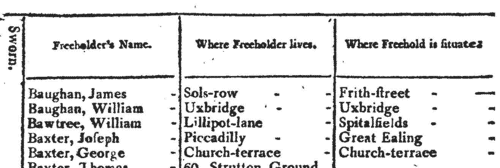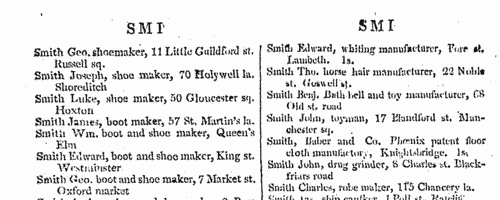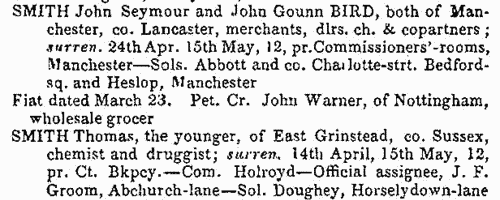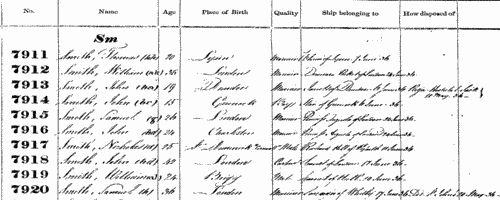Linnett Surname Ancestry ResultsOur indexes 1800-1900 include entries for the spelling 'linnett'. In the period you have requested, we have the following 33 records (displaying 1 to 10): Single Surname Subscription | | | Buying all 33 results of this search individually would cost £186.00. But you can have free access to all 33 records for a year, to view, to save and print, for £100. Save £86.00. More... |
These sample scans are from the original record. You will get scans of the full pages or articles where the surname you searched for has been found. Your web browser may prevent the sample windows from opening; in this case please change your browser settings to allow pop-up windows from this site. Freeholder voters in Middlesex
(1802)
A poll to elect two knights of the shire to represent the county of Middlesex, was held at Brentford 13 to 29 July 1802. The electors were the adult male freeholders of more than 40s per annum of real estate. This poll book lists the voters alphabetically by surname, giving christian name, abode, where the freehold was situate, the nature of the freehold (such as messuage, house, land, rent-charge &c.), the occupier's name, and whether the freeholder voted for William Mainwaring, George Byng or sir Francis Burdett. The entries are printed across facing pages, of which this sample shows part of a lefthand page. For each name indexed, the matching pair of scans is provided. This is the index to the freeholders.
LINNETT. Cost: £6.00.  | Sample scan, click to enlarge

|  Apprentices and clerks
(1803) Apprentices and clerks
(1803)
Apprenticeship indentures and clerks' articles were subject to a 6d or 12d per pound stamp duty: the registers of the payments usually give the master's trade, address, and occupation, and the apprentice's name, as well as details of the date and length of the apprenticeship. 3 January to 31 December 1803. IR 1/39LINNETT. Cost: £8.00.  | Sample scan, click to enlarge

| Traders and professionals in London
(1805)
Holden's Triennial Directory for 1805 to 1807 includes this 'London Alphabet of Businesses, Professions, &c.': coverage is good; about 30,000 individuals are recorded.LINNETT. Cost: £4.00.  | Sample scan, click to enlarge

| Essex Freeholders: Chelmsford hundred
(1810)
The poll of the freeholders of Essex at the election of a knight of the shire to serve in Parliament, taken at Chelmsford 31 January 1810 and fourteen following days (Sundays excepted). The candidates were John Archer Houblon esquire and Montagu Burgoyne esquire. This poll book gives the names of the voters arranged by initial letter of surname division by division. The freeholders' full names are stated, surname first, residence (often elsewhere), and place where the freehold lay. The right hand column records their votes. The qualification for suffrage in the counties was the possession of a freehold estate worth more than 40s a year. The electoral divisions comprised these hundreds: I. Barstable and Chafford; II. Becontree and Waltham; III. Chelmsford; IV. Hinckford; V. Tendring; VI. Uttleford, Clavering and Dunmow; VII. Harlow, Ongar and Freshwell; VIII. Lexden, Colchester and Witham; IX. Rochford and Thurstable; X. Dengie and Winstree.
LINNETT. Cost: £6.00.  | Sample scan, click to enlarge

| Workers at Ancoats Cotton Twist Company Mill
(1818)
The minutes of evidence taken before the Lords Committee on the Cotton Factories Bill include a series of reports by medical men as to the general health of the mill workers in April 1818. For each factory there is a complete list of workers, giving full name, age, how long employed in a factory, health (in general terms, such as 'Good' or 'Sickly'), and any chronic disease or 'distortion', cause and duration - with slight variations from report to report. The physicians examined several hundred people each day, asking such questions as 'Have you any swellings or sores anywhere?', 'Are your limbs straight?', 'Have you a good appetite for food?', 'Do you conceive yourself to be in good health?', and all concluded that the health of the mill workers was good, and that the workers were cheerful. This is the report for David Holt's Ancoats Cotton Twist Co. mill, 21 April 1818.LINNETT. Cost: £6.00.  | Sample scan, click to enlarge

| Voters in Northampton
(1826)
A poll to elect two burgesses to represent the town and borough of Northampton, was held there 12 to 20 June 1826. This poll book lists the voters alphabetically by surname, giving christian name, abode, occupation (in italics), and whether they voted for sir George Robinson, sir Robert Henry Gunning, or William Leader Maberly.
LINNETT. Cost: £6.00.  | Sample scan, click to enlarge

| Bankrupts
(1835)
Bankruptcy notices for England and Wales: bankruptcy often caused people to restart their lives elsewhere, so these are an important source for lost links
LINNETT. Cost: £6.00.  | Sample scan, click to enlarge

|  British merchant seamen
(1835-1836) British merchant seamen
(1835-1836)
At this period, the foreign trade of ships plying to and from the British isles involved about 150,000 men on 15,000 ships; and the coasting trade about a quarter as many more. A large proportion of the seamen on these ships were British subjects, and so liable to be pressed for service in the Royal Navy; but there was no general register by which to identify them, so in 1835 parliament passed a Merchant Seamen's Registration Bill. Under this act this large register of British seamen was compiled, based on ships' crew lists gathered in British and Irish ports, and passed up to the registry in London. Each seaman was assigned a number, and the names were arranged in the register by first two letters of the surname (our sample scan shows one of the pages for 'Sm'); in addition, an attempt was made to separate out namesakes by giving the first instance of a name (a), the second (b), and so on. But no effective method was devised to prevent the same man being registered twice as he appeared in a second crew list; moreover, the original crew lists were clearly difficult for the registry clerks to copy, and some of the surname spellings appear to be corrupted. A parliamentary committee decided that the system devised did not answer the original problem, and this register was abandoned after less than two years: but it is an apparently comprehensive source for British merchant seamen in 1835 to 1836. The register records the number assigned to each man; his name; age; birthplace; quality (master, captain, mate, 2nd mate, mariner, seaman, fisherman, cook, carpenter, boy &c.); and the name and home port of his ship, with the date of the crew list (usually at the end of a voyage). Most of the men recorded were born in the British Isles, but not all (for instance, Charleston and Stockholm appear in the sample scan). The final column 'How disposed of' is rarely used, and indicates those instances where a man died, was discharged, or deserted his ship during the voyage.LINNETT. Cost: £8.00.  | Sample scan, click to enlarge

| Members of the Phonographic Corresponding Society
(1843)
The Phonotypic Journal, published weekly, contains lists of new members of the Phonographic Corresponding Society, alterations (such as changes of address), and lists of contributions to the Fund for purchasing a Phonotypic Fount. The lists of new members give full name (surname first) and address.LINNETT. Cost: £6.00.  | Sample scan, click to enlarge

| Inhabitants of Birmingham
(1850)
Francis White & Co.'s History, Gazetteer, and Directory of Warwickshire for 1850 lists nobility, gentry, clergy, other private residents, farmers and traders, hundred by hundred and village by village, with separate sections for the large towns. This long alphabetical section lists inhabitants of Birmingham.LINNETT. Cost: £4.00.  | Sample scan, click to enlarge

|
Research your ancestry, family history, genealogy and one-name study by direct access to original records and archives indexed by surname.
|













